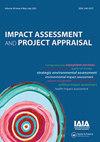Substantive, normative and transactive effectiveness of EIA: perception of key actors in Namibia
IF 1.9
4区 社会学
Q3 ENVIRONMENTAL STUDIES
引用次数: 0
Abstract
ABSTRACT EIA has become an important environmental management tool because it is supported by enforceable legal backing. However, its effectiveness has been debated, especially in developing countries where systems are often mimicked from the Western world. EIA in Namibia has been in place since the enactment of the legislation in 2007 and 2012 respectively. This paper investigates EIA's substantive, normative, and transactive effectiveness in Namibia as perceived by key actors. Data were collected through survey questionnaires and triangulated with semi-structured interviews. A total of 110 actors responded to the survey and 25 experts were interviewed. Interviewees perceive EIA in Namibia as moderately and marginally effective in supporting substantive, normative, and transactive effectiveness. They further perceive that various contextual and administrative challenges affect EIA effectiveness in Namibia. Challenges include poor administration, restrained consideration of assessment findings in decisions, limited learning and environmental awareness opportunities, inadequate public participation, funding, and poor monitoring, and reporting. Interviewees also highlighted political will as necessary to improve funding and appropriate institutional arrangement. Actors perceive that projects meant to improve the livelihood of impoverished communities can be accepted while foregoing environmental objectives. With targeted improvements, EIA can effectively facilitate good environmental decisions, resource mobilisation, and sustainability in Namibia.环境影响评估的实质性、规范性和交易有效性:纳米比亚主要行为者的看法
摘要环境影响评价已成为一种重要的环境管理工具,因为它有可执行的法律支持。然而,它的有效性一直存在争议,尤其是在发展中国家,那里的系统经常模仿西方世界。纳米比亚的环境影响评估自2007年和2012年立法以来一直在实施。本文调查了关键行为者认为的环境影响评估在纳米比亚的实质性、规范性和交易有效性。数据通过调查问卷收集,并通过半结构化访谈进行三角测量。共有110名演员对调查作出回应,25名专家接受了采访。受访者认为纳米比亚的环境影响评估在支持实质性、规范性和交易有效性方面具有适度和边际的有效性。他们进一步认为,各种背景和行政挑战影响了纳米比亚的环境影响评估有效性。挑战包括管理不善、决策中对评估结果的考虑有限、学习和环境意识机会有限、公众参与、资金不足以及监测和报告不力。受访者还强调了改善资金和适当体制安排的必要政治意愿。行动者认为,旨在改善贫困社区生计的项目可以在实现环境目标的同时被接受。通过有针对性的改进,环评可以有效地促进纳米比亚的良好环境决策、资源调动和可持续性。
本文章由计算机程序翻译,如有差异,请以英文原文为准。
求助全文
约1分钟内获得全文
求助全文
来源期刊

Impact Assessment and Project Appraisal
ENVIRONMENTAL STUDIES-
CiteScore
4.60
自引率
22.70%
发文量
52
期刊介绍:
This is the international, peer-reviewed journal of the International Association for Impact Assessment (IAIA). It covers environmental, social, health and other impact assessments, cost-benefit analysis, technology assessment, and other approaches to anticipating and managing impacts. It has readers in universities, government and public agencies, consultancies, NGOs and elsewhere in over 100 countries. It has editorials, main articles, book reviews, and a professional practice section.
 求助内容:
求助内容: 应助结果提醒方式:
应助结果提醒方式:


